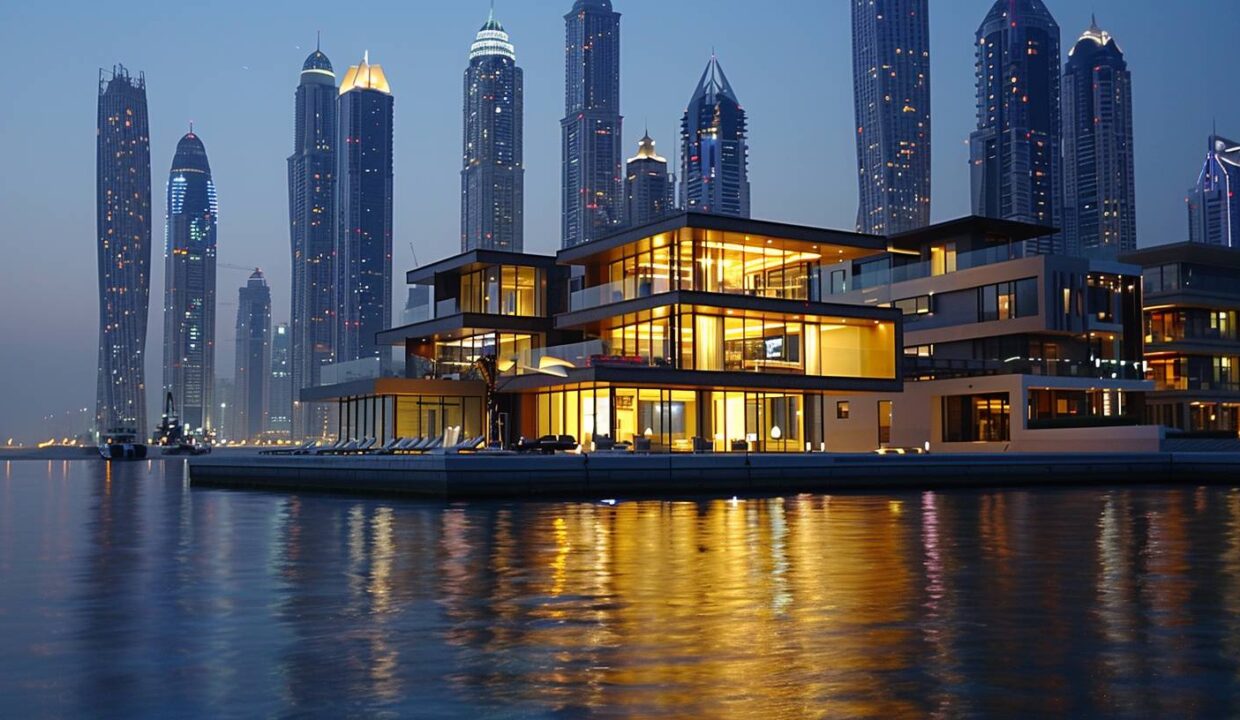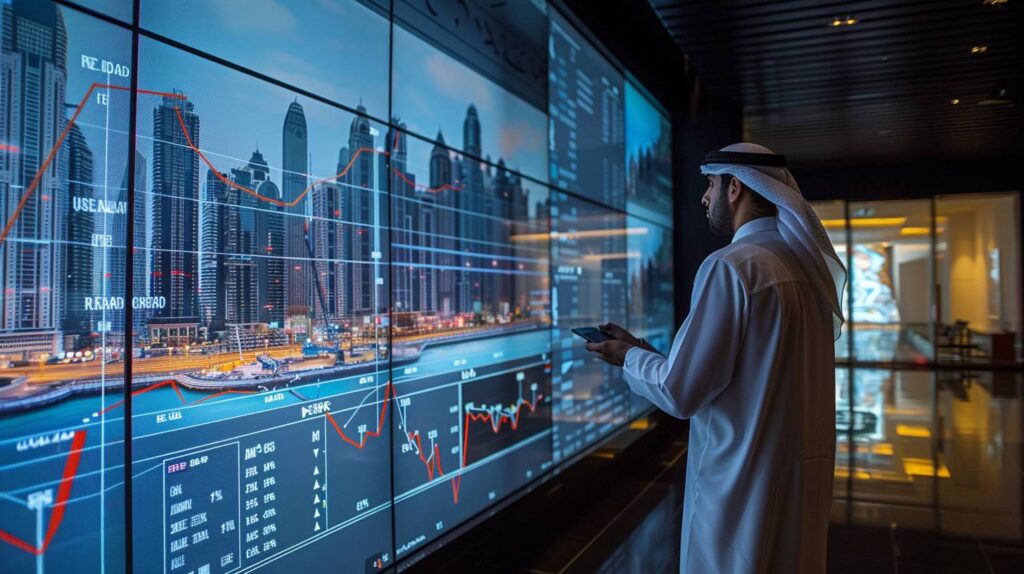
Is investing in real estate in Dubai the right choice for you? With a market that promises both high returns and risks, it’s easy to feel uncertain about where to start. But you don’t have to navigate this complex market alone.
As an investor, you’re the hero, seeking wealth growth, security, and lucrative opportunities in the thriving Dubai real estate market. We understand the challenges you face, and we’re here to guide you through it. In this article, we’ll cover:
- The pros and cons of Dubai real estate
- Key insights into market trends
- How to maximize returns
By following this simple roadmap, you’ll be equipped to make a confident, informed decision. Keep reading and take the first step towards a profitable investment journey. Success is just a decision away!
1. Dubai Real Estate: A Golden Opportunity or a Risky Bet?
Dubai is famous for its massive skyscrapers, stunning waterfront properties, and modern infrastructure. It’s often considered an attractive investment destination, especially for property investors.
With its tax benefits—including no income tax or annual property taxes—the city continues to attract international investors looking for high returns in a business-friendly environment.
However, Dubai’s rapid development has raised some concerns. Areas like Dubai Marina and Dubai Hills Estate have seen significant growth, but the potential for rising property prices and the risk of oversupply in certain areas are factors to consider.
While it offers significant opportunities, real estate investors should always stay informed about the current market conditions and perform due diligence before committing to a property purchase.
See Also Fazaa Card For Golden Visa Holder
2. Investing in Dubai Property: Pros and Cons You Need to Know
When thinking about investing in Dubai property, it’s important to look at both the good and bad sides. The market has great opportunities, but knowing the pros and cons helps you make a smart choice. Let’s look at the key benefits and risks of investing in Dubai real estate.
Pros
- High Rental Income: Dubai has high rental yields compared to many other cities. Areas like Dubai Marina, Business Bay, and Dubai Sports City attract tenants, giving investors strong rental income from both homes and businesses. The demand for luxury villas and high-end apartments offers profitable chances.
- Tax-Free Environment: Dubai doesn’t have income tax or annual property taxes. This makes it very attractive for those wanting to maximize returns on their property investment.
- High Demand for Residential Properties: A steady flow of expatriates and professionals keeps demand for homes high, especially in popular areas like Dubai Marina, Dubai Hills Estate, and Business Bay. Whether you invest in freehold properties or off-plan properties, there’s potential for quick rental returns and long-term growth.
Cons
- Market Volatility: Like any real estate market, Dubai’s can change. Rising property prices in some areas can be both good and bad. While there are chances for appreciation, there’s also the risk of too many properties, especially in new developments.
- Regulatory Changes: Dubai’s property laws usually favor investors, especially with the option of freehold ownership for foreign investment in certain areas. However, changes in rules can impact the market, so investors need to stay updated with any shifts in policies that may affect their property purchase.
- High Initial Costs: Buying properties in top locations like Dubai Marina or Business Bay can be expensive, especially for luxury villas or commercial spaces. Also, off-plan properties, while offering great growth potential, come with risks like delayed construction or market changes.
3. Is Dubai’s Real Estate Market Worth Your Investment?
Dubai is a global business hub with a strong economy and a booming tourism industry, making it an attractive place for property investors. For those wanting to diversify their investments, Dubai real estate offers great opportunities, especially in areas like Dubai Marina, Dubai Sports City, and Dubai Hills Estate.
However, the market has its challenges. Property prices can change quickly, and there’s always a risk of the market adjusting. For international investors, it’s important to balance the chance for high returns with the risks of too many properties and market shifts.
Overall, buying property in Dubai, especially in popular or new areas, can be very profitable if you plan wisely and stay informed.
4. Dubai Real Estate: High Returns or High Risks?
Dubai’s real estate market is widely regarded for its potential to generate high returns for investors. Areas such as Dubai Marina, Business Bay, and Dubai Hills Estate have seen impressive growth, making them desirable for both residential properties and commercial spaces.
However, with high returns come high risks, and understanding both sides of the equation is crucial for any property investor looking to succeed in the market.
High Returns:
- Capital Appreciation: Many areas in Dubai, especially those near major business districts and developments like Dubai Marina and Dubai Sports City, have seen significant capital appreciation over the years. Property values continue to rise as demand increases due to Dubai’s status as a global business hub.
- Attractive Rental Yields: Dubai offers some of the highest rental yields in the world, especially in high-demand areas. With a strong economy and a steady influx of expatriates, residential properties and commercial spaces continue to offer excellent returns on rental income.
- Tax-Free Environment: The absence of income tax and annual property taxes in Dubai makes it a highly profitable market for those seeking to generate income from rental properties. This allows property investors to maximize their returns on investment without the burden of heavy tax liabilities.
- Growing Demand for Luxury Properties: With an increasing number of international investors and high-net-worth individuals, the demand for luxury villas and high-end apartments in premium areas remains strong, providing opportunities for long-term capital growth.
High Risks:
- Market Volatility: The Dubai real estate market is known for its cyclical nature. While certain areas experience consistent growth, others face periods of price correction or stagnation. As a result, the market can be unpredictable, especially in emerging locations where property prices may fluctuate more rapidly.
- Oversupply in Certain Areas: Rapid development in some parts of the city has led to an oversupply of both residential and commercial properties. In locations like Business Bay and Dubai Sports City, investors may find it challenging to achieve significant returns if the market becomes saturated with too many similar properties.
- Delays with Off-Plan Properties: Investing in off-plan properties presents a unique set of risks. While these properties offer the potential for capital growth, construction delays, changes in project plans, or fluctuations in demand can affect the final value of the property, making it a riskier investment option compared to established properties.
- Regulatory Risks: While Dubai is known for its investor-friendly policies, regulatory changes can still impact the market. Real estate investors must stay updated on changes in ownership laws, particularly with respect to foreign investment and freehold ownership, as these could potentially affect the overall return on investment.
In conclusion, while Dubai’s real estate market offers high returns, it also comes with its share of high risks. Investors need to carefully evaluate market trends, choose the right location, and diversify their portfolios to minimize risks.
By conducting thorough due diligence and seeking expert advice, investors can successfully navigate the Dubai real estate market and capitalize on its lucrative potential.
5. The Truth About Investing in Dubai’s Property Market
Dubai’s real estate market is one of the best in the world. Whether you want to buy a property to live in, rent out, or start a business, places like Dubai Marina and Business Bay are great choices. You’ll earn good rental income, and your property’s value is likely to go up.
However, to make the most of these opportunities, investors need to consider:
- Rising property prices
- The booming tourism industry
- The long-term future of property in Dubai
Dubai’s appeal as a global business hub with world-class amenities attracts many investors from around the world. But investing in Dubai real estate is not without risks. As with any property investment, it’s essential to:
- Research the market thoroughly
- Understand local regulations
- Work with a qualified real estate agent to ensure you make the best decision
See Also Golden Visa Insurance
Key Takeaways: Is It Worth Investing in Real Estate in Dubai?
Dubai’s real estate market offers both tremendous opportunities and inherent risks. On one hand, you can earn a lot of money from rent, watch your property value go up, and enjoy tax-free benefits. This makes Dubai a great place for local and international investors.
Areas like Dubai Marina, Business Bay, and Dubai Hills Estate are particularly popular, offering a combination of luxury properties and world-class amenities that draw a steady demand from expats, business professionals, and tourists. The city’s status as a global business hub and its strong tourism industry also help ensure long-term growth potential.
But, investors should know that the market can go up and down, there might be too many properties, and there are risks with buying properties that are still being built. While Dubai offers great opportunities to make money, you need to think carefully about the market and the rules.
Doing your homework and planning well can help you avoid these risks and make the most of the chances Dubai’s real estate market offers.
FAQ
What are the potential returns on investment in Dubai’s real estate market?
Dubai offers high rental yields of 5-8% annually, with areas like Dubai Marina and Business Bay providing strong capital appreciation and consistent demand.
What are the risks associated with investing in real estate in Dubai?
Risks include market volatility, oversupply in certain areas, regulatory changes, and delays with off-plan properties. Careful research and planning can help mitigate these.








